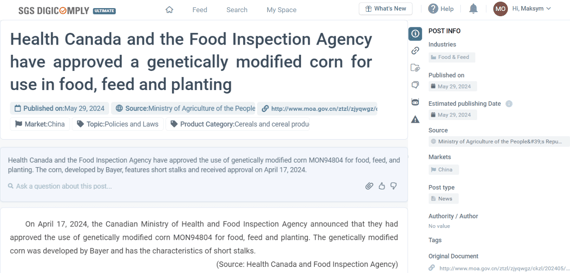In a significant move for agricultural biotechnology, Health Canada and the Canadian Food Inspection Agency (CFIA) announced on April 17, 2024, the approval of genetically modified corn MON94804 for use in food, feed, and planting. Developed by Bayer, this approval signifies Canada's commitment to embracing innovative solutions to meet the challenges of modern agriculture.
This notification was timely identified and is available to users through the SGS Digicomply Regulatory Agenda. It offers a comprehensive list of regulatory deadlines, including historical and upcoming dates, with detailed insights and analysis. Explore the demo to try this tool in action.
Advancements in Genetic Modification
The approval of MON94804 represents a culmination of Bayer's efforts to engineer corn with specific traits beneficial for both farmers and consumers. One notable characteristic of MON94804 is its short stalks, which offer advantages such as increased resistance to adverse weather conditions and improved accessibility during harvesting. This genetic modification reflects the ongoing pursuit of agricultural advancements to enhance crop resilience and yield.
Rigorous Regulatory Evaluation
Before granting approval, Health Canada and CFIA conducted thorough assessments to ensure the safety and efficacy of MON94804. These evaluations encompassed a comprehensive analysis of the genetic modifications, nutritional composition, and potential environmental impacts associated with the genetically modified corn.
-
Genetic Analysis: Detailed examinations of the corn's genetic makeup were conducted to assess the stability and heritability of the introduced traits. Evaluations focused on understanding the functionality and expression of genetic components in plant tissues, as well as their potential interactions with non-target organisms.
-
Nutritional and Safety Assessments: Extensive comparisons between MON94804 and conventional corn varieties were performed to ascertain their nutritional equivalence. Studies evaluated proximate composition, amino acid profiles, mineral content, and the presence of anti-nutritional factors. Furthermore, rigorous tests were conducted to assess the allergenicity and toxicity of the introduced proteins.
-
Environmental Impact Evaluation: Assessments examined the potential environmental implications of MON94804, including its propensity for weediness, interactions with other organisms, and responses to biotic and abiotic stressors. Findings indicated that MON94804 poses no greater environmental risk than non-modified corn varieties.
Implications for Agriculture and Food Security
The approval of MON94804 holds promising implications for Canadian agriculture and global food security:
- Enhanced Crop Resilience: The short stature of MON94804 enhances its resilience to adverse weather conditions, reducing the risk of crop losses and ensuring stable yields.
- Improved Harvest Efficiency: Farmers benefit from improved access to farming equipment due to the compact nature of MON94804, leading to increased operational efficiency during harvesting.
- Sustainable Agricultural Practices: By facilitating higher yields and minimizing losses, MON94804 promotes more sustainable agricultural practices, contributing to long-term food security goals.
Global Acceptance and Future Prospects
While Canada has approved MON94804 for various uses, other countries are also evaluating its import and cultivation. For instance, Food Standards Australia New Zealand (FSANZ) is currently reviewing an application for the import of food products derived from MON94804. However, its cultivation in these countries would require separate regulatory approvals.
The global acceptance of genetically modified crops like MON94804 underscores the pivotal role of biotechnology in addressing agricultural challenges and meeting the demands of a growing population. As more countries embrace such technologies, it fosters international collaboration and paves the way for sustainable agricultural development worldwide.
Conclusion
The approval of genetically modified corn MON94804 by Health Canada and CFIA represents a significant milestone in agricultural innovation. This decision not only underscores the rigorous scientific evaluations involved in ensuring the safety and efficacy of GMOs but also highlights Canada's commitment to advancing sustainable and resilient food systems. As MON94804 enters the market, it holds promise for enhancing agricultural productivity and contributing to global food security efforts.
For more detailed inquiries, stakeholders can reach out directly to Health Canada and the Canadian Food Inspection Agency (CFIA), the regulatory bodies overseeing the approval of genetically modified organisms in Canada, or utilize the SGS Digicomply platform for comprehensive insights and updates. Feel free to get in touch now to learn about implementing the Regulatory Intelligence Hub for your company. Or explore the demo and try this tool in action.






.webp?width=1644&height=1254&name=Food%20Safety%20Dashboard%201%20(1).webp)
